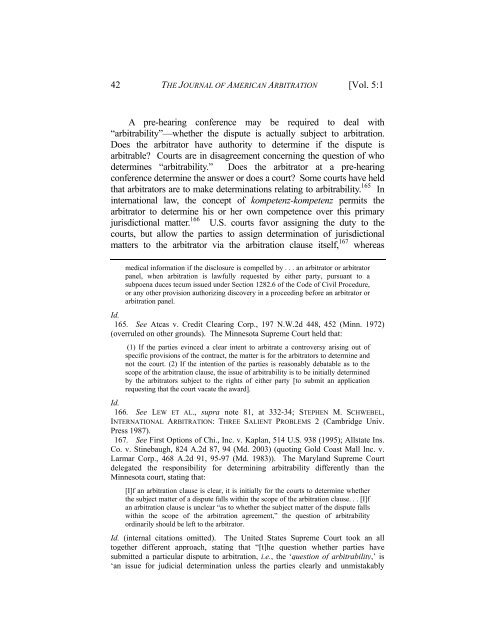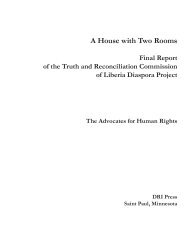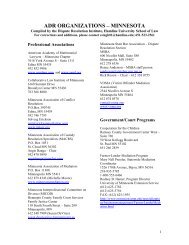2006/Vol. 5 No.1 - Hamline Law - Hamline University
2006/Vol. 5 No.1 - Hamline Law - Hamline University
2006/Vol. 5 No.1 - Hamline Law - Hamline University
You also want an ePaper? Increase the reach of your titles
YUMPU automatically turns print PDFs into web optimized ePapers that Google loves.
42 THE JOURNAL OF AMERICAN ARBITRATION [<strong>Vol</strong>. 5:1<br />
A pre-hearing conference may be required to deal with<br />
“arbitrability”—whether the dispute is actually subject to arbitration.<br />
Does the arbitrator have authority to determine if the dispute is<br />
arbitrable? Courts are in disagreement concerning the question of who<br />
determines “arbitrability.” Does the arbitrator at a pre-hearing<br />
conference determine the answer or does a court? Some courts have held<br />
that arbitrators are to make determinations relating to arbitrability. 165 In<br />
international law, the concept of kompetenz-kompetenz permits the<br />
arbitrator to determine his or her own competence over this primary<br />
jurisdictional matter. 166 U.S. courts favor assigning the duty to the<br />
courts, but allow the parties to assign determination of jurisdictional<br />
matters to the arbitrator via the arbitration clause itself, 167 whereas<br />
medical information if the disclosure is compelled by . . . an arbitrator or arbitrator<br />
panel, when arbitration is lawfully requested by either party, pursuant to a<br />
subpoena duces tecum issued under Section 1282.6 of the Code of Civil Procedure,<br />
or any other provision authorizing discovery in a proceeding before an arbitrator or<br />
arbitration panel.<br />
Id.<br />
165. See Atcas v. Credit Clearing Corp., 197 N.W.2d 448, 452 (Minn. 1972)<br />
(overruled on other grounds). The Minnesota Supreme Court held that:<br />
(1) If the parties evinced a clear intent to arbitrate a controversy arising out of<br />
specific provisions of the contract, the matter is for the arbitrators to determine and<br />
not the court. (2) If the intention of the parties is reasonably debatable as to the<br />
scope of the arbitration clause, the issue of arbitrability is to be initially determined<br />
by the arbitrators subject to the rights of either party [to submit an application<br />
requesting that the court vacate the award].<br />
Id.<br />
166. See LEW ET AL., supra note 81, at 332-34; STEPHEN M. SCHWEBEL,<br />
INTERNATIONAL ARBITRATION: THREE SALIENT PROBLEMS 2 (Cambridge Univ.<br />
Press 1987).<br />
167. See First Options of Chi., Inc. v. Kaplan, 514 U.S. 938 (1995); Allstate Ins.<br />
Co. v. Stinebaugh, 824 A.2d 87, 94 (Md. 2003) (quoting Gold Coast Mall Inc. v.<br />
Larmar Corp., 468 A.2d 91, 95-97 (Md. 1983)). The Maryland Supreme Court<br />
delegated the responsibility for determining arbitrability differently than the<br />
Minnesota court, stating that:<br />
[I]f an arbitration clause is clear, it is initially for the courts to determine whether<br />
the subject matter of a dispute falls within the scope of the arbitration clause. . . [I]f<br />
an arbitration clause is unclear “as to whether the subject matter of the dispute falls<br />
within the scope of the arbitration agreement,” the question of arbitrability<br />
ordinarily should be left to the arbitrator.<br />
Id. (internal citations omitted). The United States Supreme Court took an all<br />
together different approach, stating that “[t]he question whether parties have<br />
submitted a particular dispute to arbitration, i.e., the ‘question of arbitrability,’ is<br />
‘an issue for judicial determination unless the parties clearly and unmistakably
















